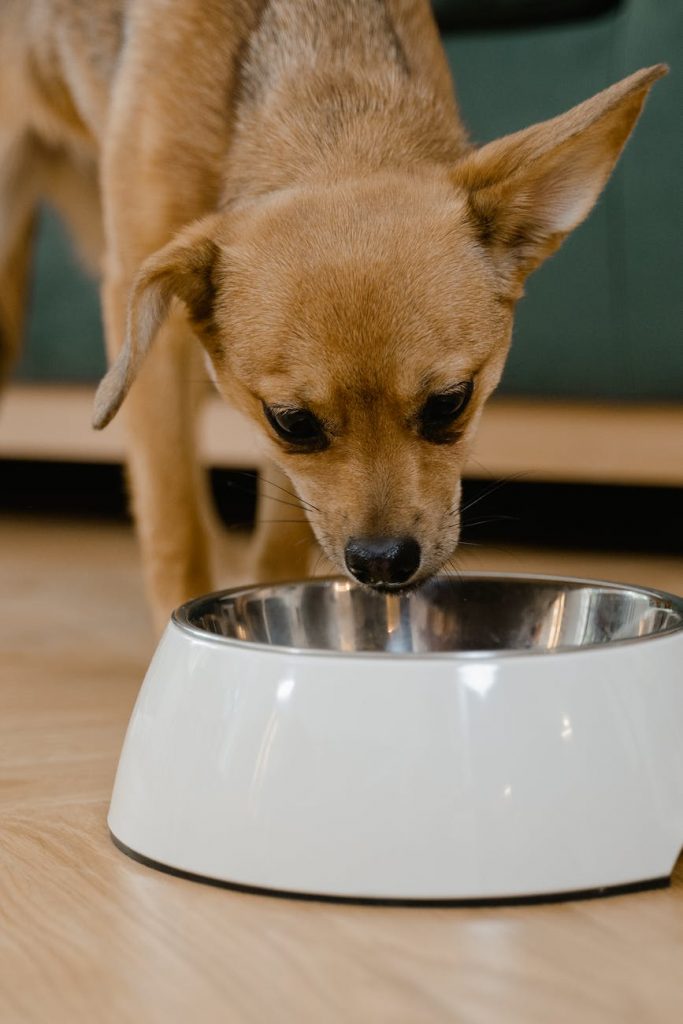Table of Contents
- Introduction
- Understanding the Chihuahua’s Dietary Needs
2.1. Size Matters: Tailoring Portions to Your Chihuahua
2.2. Essential Nutrients for Optimal Health
2.3. Water: The Elixir of Life - Choosing the Right Food for Your Chihuahua
3.1. Commercial Dog Food vs. Homemade Meals
3.2. Reading Dog Food Labels
3.3. Common Foods to Avoid - Establishing a Feeding Schedule
4.1. The Importance of Consistency
4.2. Avoiding Overfeeding and Obesity - Maintaining a Healthy Weight
5.1. Regular Exercise for Chihuahuas
5.2. Indoor vs. Outdoor Activities - Addressing Dietary Restrictions and Allergies
6.1. Identifying Food Allergies
6.2. Switching to Hypoallergenic Diets - Special Diets for Different Life Stages
7.1. Caring for Chihuahua Puppies
7.2. Nutrition for Senior Chihuahuas - Supplementing Your Chihuahua’s Diet
8.1. Vitamins and Minerals
8.2. Probiotics for Digestive Health - Avoiding Common Feeding Mistakes
9.1. Feeding Human Food as Treats
9.2. Free-Feeding vs. Scheduled Meals - Ensuring Proper Hydration
10.1. Providing Fresh Water
10.2. Signs of Dehydration - Recognizing Signs of Nutritional Imbalances
11.1. Dull Coat and Skin Issues
11.2. Digestive Problems - Consulting with a Veterinarian or Nutritionist
- Conclusion
Introduction
Chihuahuas are undoubtedly one of the most adorable and lovable dog breeds around. These tiny companions come with big personalities and deserve the very best care, including a well-balanced and nutritious diet. A proper chihuahua diet is essential to ensure their overall health and longevity. In this article, we’ll explore the key aspects of a chihuahua’s dietary needs and provide valuable tips to keep your furry friend healthy and happy.
Understanding the Chihuahua’s Dietary Needs
2.1 Size Matters: Tailoring Portions to Your Chihuahua
Chihuahuas are known for their petite size, and as such, their nutritional requirements differ from larger breeds. Portion control is crucial to prevent overeating and obesity, which can lead to various health issues. Your chihuahua’s age, weight, and activity level should all be considered when determining the right portion size.
2.2 Essential Nutrients for Optimal Health
A well-balanced diet for your chihuahua should include essential nutrients such as proteins, carbohydrates, fats, vitamins, and minerals. Proteins are particularly important for muscle maintenance and repair, while carbohydrates provide a source of energy. Fats are necessary for healthy skin and coat, and vitamins and minerals support various bodily functions.
2.3 Water: The Elixir of Life
Never underestimate the importance of water for your chihuahua. Adequate hydration is vital for proper digestion, temperature regulation, and overall well-being. Always ensure that fresh, clean water is available for your furry companion.
Choosing the Right Food for Your Chihuahua
3.1 Commercial Dog Food vs. Homemade Meals
When it comes to feeding your chihuahua, you have the option of commercial dog food or preparing homemade meals. High-quality commercial dog food can provide a balanced diet, but homemade meals allow you to have more control over the ingredients. Whichever option you choose, consult your veterinarian for guidance.
3.2 Reading Dog Food Labels
Understanding how to read dog food labels is essential for making informed choices. Look for dog foods that list quality protein sources as the primary ingredient, avoid those with excessive fillers or additives, and check for any allergens your chihuahua may be sensitive to.
3.3 Common Foods to Avoid
Some human foods can be harmful or toxic to chihuahuas. Avoid feeding your furry friend chocolate, caffeine, grapes, raisins, onions, garlic, and any food with artificial sweeteners. Additionally, be cautious with bones, as they can pose choking hazards.
Establishing a Feeding Schedule
4.1 The Importance of Consistency
Chihuahuas thrive on routine, and a consistent feeding schedule is no exception. Try to feed your chihuahua at the same times each day to regulate their digestion and prevent overeating.
4.2 Avoiding Overfeeding and Obesity
Chihuahuas are prone to obesity, which can lead to serious health issues. Avoid overfeeding by following portion recommendations and limiting treats.
Maintaining a Healthy Weight
5.1 Regular Exercise for Chihuahuas
Exercise is vital for keeping your chihuahua in good shape. Regular walks, playtime, and interactive toys can help burn off excess energy and maintain a healthy weight.
5.2 Indoor vs. Outdoor Activities
Whether you live in an apartment or a house with a yard, there are plenty of ways to keep your chihuahua active and engaged. Indoor play and outdoor walks both contribute to their overall well-being.
Addressing Dietary Restrictions and Allergies
6.1 Identifying Food Allergies
Some chihuahuas may develop food allergies or sensitivities. Watch out for signs of allergic reactions such as itching, skin irritation, or gastrointestinal problems.
6.2 Switching to Hypoallergenic Diets
If your chihuahua is diagnosed with food allergies, your veterinarian may recommend switching to a hypoallergenic diet. These specialized diets are formulated to minimize potential allergens.
Special Diets for Different Life Stages
7.1 Caring for Chihuahua Puppies
Puppies have specific dietary requirements to support their growth and development. Consult your veterinarian for a suitable puppy diet that meets their unique needs.
7.2 Nutrition for Senior Chihuahuas
As your chihuahua ages, their metabolism and nutritional needs may change. Senior-specific diets can help support their aging bodies and maintain vitality.
Supplementing Your Chihuahua’s Diet
8.1 Vitamins and Minerals
In some cases, your chihuahua may benefit from vitamin and mineral supplements. However, always consult your veterinarian before adding any supplements to their diet.
8.2 Probiotics for Digestive Health
Probiotics can promote a healthy gut and aid in digestion. They can be especially helpful for chihuahuas with sensitive stomachs.
Avoiding Common Feeding Mistakes
9.1 Feeding
Human Food as Treats
While it may be tempting to share your food with your chihuahua, some human foods can be harmful to them. Stick to dog-friendly treats to avoid potential health issues.
9.2 Free-Feeding vs. Scheduled Meals
Free-feeding, where food is available all day, can lead to overeating and weight gain. Opt for scheduled meals to control portion sizes and maintain a healthy weight.
Ensuring Proper Hydration
10.1 Providing Fresh Water
Always ensure your chihuahua has access to fresh water throughout the day. Hydration is crucial for their overall health and well-being.
10.2 Signs of Dehydration
Watch out for signs of dehydration, including lethargy, dry gums, and reduced urination. If you suspect dehydration, contact your veterinarian immediately.
Recognizing Signs of Nutritional Imbalances
11.1 Dull Coat and Skin Issues
A balanced diet is essential for a healthy coat and skin. If your chihuahua’s coat looks dull or they experience skin problems, it may be related to their diet.
11.2 Digestive Problems
Digestive issues like diarrhea or constipation may indicate dietary problems. If these issues persist, consult your veterinarian to identify and address the root cause.
Consulting with a Veterinarian or Nutritionist
If you have concerns about your chihuahua’s diet or health, don’t hesitate to seek professional advice. A veterinarian or pet nutritionist can provide personalized guidance to meet your chihuahua’s specific needs.
Conclusion
A well-balanced and nutritious diet is essential to keep your chihuahua happy and healthy throughout their life. Tailor their portions, choose high-quality food, maintain a feeding schedule, and ensure they get enough exercise. Address any dietary restrictions, consider their life stage, and provide appropriate supplements when needed. By following these guidelines and seeking professional advice when necessary, you can provide the best care for your beloved chihuahua.
FAQs
- Can I feed my chihuahua raw meat?
While some people choose to feed their chihuahuas raw diets, it’s essential to be cautious about potential bacterial contamination. Consult your veterinarian before making this dietary choice. - How often should I feed my chihuahua puppy?
Chihuahua puppies require more frequent meals to support their growth and energy needs. Typically, they should be fed three to four times a day. - What are the signs of food allergies in chihuahuas?
Signs of food allergies may include itching, red or inflamed skin, ear infections, and gastrointestinal issues like vomiting or diarrhea. - Can chihuahuas eat fruits and vegetables?
Yes, many chihuahuas enjoy fruits and vegetables as treats. However, some fruits, like grapes and raisins, are toxic to dogs, so always research which ones are safe. - How do I know if my chihuahua is overweight?
You should be able to feel your chihuahua’s ribs without pressing too hard. If you can’t, they may be overweight. Consult your veterinarian for guidance on weight management.



Pingback: "Chihuahua Food: The Key to a Healthy and Happy Pet | Chihuahua Food"
Pingback: Chihuahua Food: Providing Optimal Nutrition for Your Tiny Canine Companion
Pingback: Chihuahua Diet: A Complete Guide to Keeping Your Tiny Companion Healthy and Happy
Pingback: Chihuahua Food: A Comprehensive Guide to Providing the Best Nutrition for Your Tiny Companion - Chihuahuas Blog
Pingback: Hypoglycemia in Chihuahuas: How To Help Your Pet? - Chihuahuas Blog
Pingback: 6 Ways To Get Rid Of Tear Stains On Chihuahuas: - Chihuahuas Shop